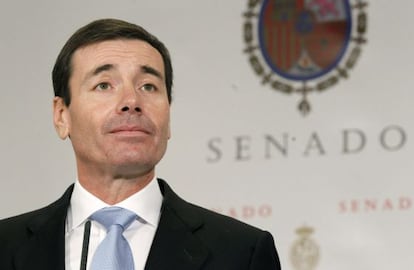Madrid Socialist leader resigns Senate seat over PP-linked judge
Gómez stages “act of rebellion” against privatization of public healthcare and carve-up of legal watchdog’s membership

The leader of the Socialist Party in Madrid (PSM), Tomás Gómez, on Wednesday announced he is resigning his seat in the Senate to “be consistent with” his principles. Gómez’s decision came in response to the national party’s pact with the Popular Party (PP) over the reshuffling of the General Council of the Judiciary (CGPJ), by which Judge Francisco Gerardo Martínez Tristán will be elevated to the legal watchdog’s panel. Martínez sits on the 50-magistrate panel of the Madrid regional High Court that has been charged with deciding the fate of six of the region’s public hospitals, which the PP wants to privatize.
Gómez informed the standing committee of the PSM of his decision late Tuesday and called a press conference at midday on Wednesday. According to PSM sources, the 20 members of the standing committee “unanimously” backed Gómez’s stance.
“In Spain there are 5,000 judges, and we have only recused one,” Gómez said of the cross-party agreement that led to the naming of Martínez to the CGPJ.
Last week, the Madrid regional High Court suspended the raft of appeals lodged by the PSM against the privatization plan while the matter of Martínez’s recusal is resolved. The PSM feels that Martínez’s links to the Popular Party – he is married to a PP politician in Castilla-La Mancha – should preclude him from participation in the healthcare privatization debate.
This form of doing politics belongs in the past. The future of this country needs to be different”
However, PSM sources said that Gómez was unaware that it was Congress, not the Senate, which would vote on the restructuring of the CGPJ, which it did on Tuesday. Gómez described his resignation as “an act of rebellion against the PP and against the dismantling of public healthcare in Madrid,” adding that his actions should be viewed solely in that light and that any other interpretation would be “completely out of line with reality.”
Gómez has been at loggerheads with Socialist Party (PSOE) leader Alfredo Pérez Rubalcaba over a number of issues in recent months, including a highly publicized bid by the Madrid leader to bring forward the planned process of primaries to elect the prime-ministerial candidate for the next general election.
Earlier this month the PP government of Prime Minister Mariano Rajoy and the Socialist Party reached an accord to share out proposed experts for the renewed CGPJ panel. After two months of negotiation, the main political parties reached a deal to include 10 PP-nominated members, seven put forward by the PSOE, and one each from the Catalan nationalist CiU bloc, the Basque Nationalist Party and the United Left.
“This is a message to the people of Madrid that the Socialists will defend public healthcare to the end,” Gómez said.
The PP regional government, though, accused Gómez of knowing full well that he would not able to vote on the matter and of using his position as senator to wage his own “internal battle” while ignoring his duty “to serve the general interests of the nation and the people of Madrid.”
Earlier this month the PP government of Prime Minister Mariano Rajoy and the Socialist Party reached an accord to share out proposed experts for the renewed CGPJ panel. After two months of negotiation, the main political parties reached a deal to include 10 PP-nominated members, seven put forward by the PSOE, and one each from the Catalan nationalist CiU bloc, the Basque Nationalist Party and the United Left.
Gómez tried unsuccessfully on Monday to persuade Rubalcaba to withdraw the party’s support for the restructuring of the CGPJ. “This form of doing politics belongs in the past. The future of this country needs to be different,” Gómez said. “Citizens expect of politicians that the independence of judicial authority is guaranteed as much as the privatization of Madrid’s public healthcare system is prevented and there is a judge, Mr Martínez Tristán, who is diametrically opposed to both things.”







































